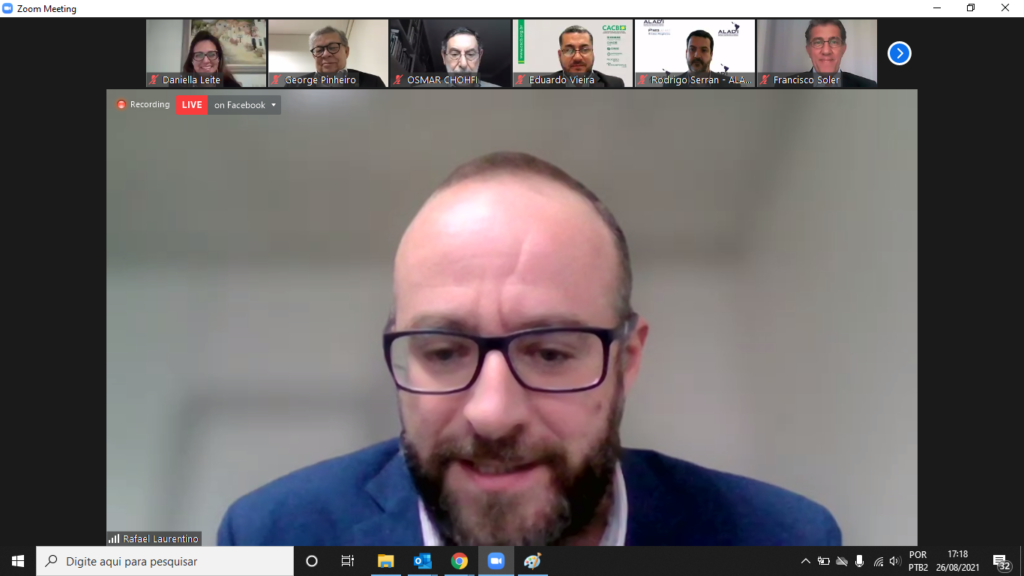São Paulo – The modernization of the procedures for issuing certificates of origin and trade agreements with Mercosur is one of the Brazilian Ministry of Economics goals. This is what Rafael Laurentino (pictured above) pointed out during the webinar ‘Rules of Origin: Mercosur – New Trade Agreements and the advancements of the CDO – Certificate of Digital Origin,’ which occurred this Thursday (26).
For Laurentino, the relevance of the Mercosur countries for Brazil extends from the cultural to commercial domains. “For this reason, we are working on the modernization of the Mercosur origin regime through steps such as flexibility, simplification of the processes, and focus on encouraging trade. Everything we do is aimed at facilitating trade. It is a critical aspect focused by the Secretariat of Foreign Trade,” pointed out Laurentino about the body’s work, being part of the Ministry.
Among the agreements Mercosur has been negotiating, the executive mentioned one with Lebanon. “It is a country we have been negotiating with for a while. We had an initial round in 2018, and since then, we have had individual conversations with the technical groups,” he said. Within the scope of Mercosur, Egypt is currently the only Arab country with an active trade agreement.
You may also enjoy reading:
- Arab Chamber offering preferential certificates of origin
- Brazilian exports to Jordan have electronic integration
Another important step towards business facilitation is to digitalize the process of origin certification. “Implementing digital origin certification has an extremely relevant advantage for foreign trade,” said Laurentino. The process contributes to making the national industry more competitive with these digital processes, believes the Foreign Trade executive of the Confederation of Trade and Business Associations in Brazil (CACB), Francisco Soler, who spoke at the webinar.
Rodrigo da Costa Serran, head of the Department of Physical and Digital Integration at the Latin American Integration Association (LAIA/ALADI), discussed methods developed by countries in the region, such as platforms for issuing and receiving documents.
Agreement between ABCC & CACB
The online event celebrated the partnership between the CACB and the Arab Brazilian Chamber of Commerce (ABCC). The agreement signed between the entities aims to expand the issuance of certificates of origin to Brazilian exporters. From now on, companies also have the support of the ABCC for issuing the documentation, which was already done by the CACB.

The president of the ABCC, Osmar Chohfi, recalled the importance of facilitating procedures like this one to maintain and expand Brazilian exports to the Arabs. “Brazil is one of the countries responsible for food security in the Arab world. This year we hope to reach the goal of 20 billion dollars [in the trade balance with the Arabs]. The first half was promising, despite the pandemic, as the Arab world buys to maintain its food security. So, this is a significant relationship for us, not only for agribusiness, but because we are going to expand the agenda,” he stated.
For the president of the CACB, George Pinheiro, the partnership amplifies the entity’s range of action. “We have 2,300 trade associations in 27 Brazilian federative units. We have a support infrastructure representing over two million entrepreneurs associated with the entities that make up the CACB,” he said.
Chohfi recalled that issuing preferential certificates of origin allows the benefit of tariffs to ship products to countries with which Brazil has free trade agreements. The president emphasized the organization is working towards new agreements with the Arabs. “It is another trade facilitation,” he said.
The event was moderated by Daniella Leite, New Business director of the ABCC, who recalled processes within the organization are also evolving. “The world is changing, and so is the Arab Brazilian Chamber. We partnered with Jordan. We already have an agreement with Qatar,” said Leite.
The partnership with Jordan, mentioned by the director, is for the electronic issuance of export documents in sales from Brazil to the Arab country, agreed upon by the ABCC and the Arab country’s Customs Authority. “The ABCC is developing a blockchain platform, and we signed the first agreement with Jordan. As of September 15, we will have a much greater fluidity in commercial relations regarding customs and logistical clearance with Jordan,” reinforced Osmar Chohfi.
Translated by Elúsio Brasileiro




